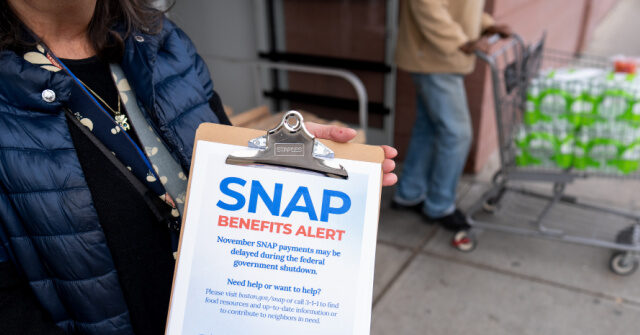WASHINGTON — The Supreme Court on Thursday blocked a lower court order that would have forced the Trump administration to distribute full benefits under the Supplemental Nutrition Assistance Program (SNAP) for November, providing temporary relief to the administration amid an ongoing government shutdown.
The ruling came in response to an emergency request from the administration, which argued that it lacked the funds to comply with the order from U.S. District Judge John McConnell in Rhode Island. McConnell had mandated that full SNAP payments be made by Friday, November 8, 2025, to address delays caused by the shutdown, which has now stretched into its 38th day.
Supreme Court Justice Ketanji Brown Jackson issued the temporary pause, according to reports from the Associated Press and The New York Times. In her order, Jackson stated that the stay was intended 'to give an appeals court more time to weigh the legal arguments raised by the government.' She emphasized that the decision did not address 'the legality' of the Trump administration's actions regarding SNAP funding.
The controversy stems from the partial government shutdown that began last month, leaving approximately 42 million SNAP recipients without their expected benefits at the start of November. SNAP, commonly known as food stamps, provides nutritional assistance to low-income individuals and families across the United States. The program is administered by the U.S. Department of Agriculture (USDA) through its Food and Nutrition Service (FNS).
Prior to the Supreme Court's intervention, the USDA had issued a memo indicating plans to comply with McConnell's order. The memo, dated November 7, 2025, stated that FNS was 'working towards implementing November 2025 full benefit issuances in compliance with the November 6, 2025, order from the District Court of Rhode Island.' It further noted that 'later today, FNS will complete the process necessary to make funds available to support your subsequent transmittal of full issuance files to your EBT processor.'
The memo also highlighted the urgency of the situation, explaining that the agency was aiming to ensure funds were accessible despite the shutdown's constraints on federal operations.
The administration, however, contended that it could only draw from a limited contingency fund, which would allow for partial payments rather than the full amounts ordered by the judge. Officials asked the appeals court to suspend any requirements to spend beyond what was available in that fund, allowing them to proceed with scaled-back distributions for the month.
Several states had already begun preparing to issue full benefits in anticipation of compliance with McConnell's ruling. According to NPR, states including Pennsylvania, Oregon, and California announced they would distribute complete SNAP payments to recipients. For instance, Pennsylvania officials said they were coordinating with federal agencies to ensure timely delivery, while California's Department of Social Services confirmed similar plans.
The shutdown, which has affected multiple federal agencies, including the USDA, has led to widespread disruptions. SNAP beneficiaries, many of whom rely on the program for essential food purchases, reported not receiving their electronic benefits transfer (EBT) cards reloaded at the beginning of the month. Advocacy groups have voiced concerns about the impact on vulnerable populations, such as families with children and the elderly.
Judge McConnell's order originated from a lawsuit filed in the District Court of Rhode Island, where plaintiffs argued that the administration's handling of SNAP during the shutdown violated federal law. The judge set a deadline of Friday, November 8, 2025, for the payments, prompting the USDA's initial memo. But the Trump administration quickly appealed, seeking intervention from higher courts.
In its request to the Supreme Court, the administration emphasized fiscal constraints, stating that exceeding the contingency fund could lead to broader budgetary issues. 'The administration asked the appeals court to suspend any court orders requiring it to spend more money than is available in a contingency fund,' reported the Associated Press, 'and instead allow it to continue with planned partial SNAP payments for the month.'
Justice Jackson's temporary stay does not resolve the underlying legal questions, leaving room for further litigation. Legal experts suggest that the case could return to the appeals court for a more substantive review, potentially addressing whether the administration's use of contingency funds complies with SNAP statutes enacted by Congress.
The broader context of the shutdown involves partisan disputes over federal spending and policy priorities under President Trump's second term. The impasse has halted funding for non-essential government functions, affecting everything from national parks to agricultural programs. SNAP, funded through annual appropriations, has been particularly hard-hit, with the USDA warning of potential shortfalls if the shutdown persists.
As the legal battle unfolds, recipients face uncertainty. Some states may proceed with partial or full payments using their own mechanisms, but federal coordination remains key. Advocacy organizations, such as the Center on Budget and Policy Priorities, have called for a swift resolution to the shutdown to prevent further hardship. 'This delay is unacceptable for millions who depend on these benefits,' said one policy analyst, speaking on condition of anonymity.
Looking ahead, the appeals court is expected to hear arguments in the coming days, which could determine whether McConnell's order is reinstated or modified. If the shutdown continues, similar disputes may arise for December benefits, potentially escalating the crisis. The Supreme Court's involvement underscores the high stakes, as the decision affects one of the nation's largest anti-poverty programs serving over 42 million people.
In the meantime, the Trump administration has maintained that it is committed to minimizing disruptions, though critics argue that partial payments fall short of meeting recipients' needs. As one USDA official noted in the memo, efforts were underway to make funds available, but the Supreme Court's block has shifted the timeline. The outcome of this case could set precedents for how federal benefits are handled during future government shutdowns, influencing policy debates in Washington for years to come.
